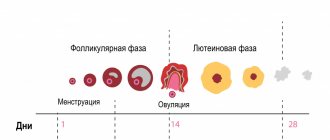What happens during menstruation
During the entire cycle, the body prepares for possible motherhood; the hormone progesterone is intensively produced. If conception does not occur, its quantity decreases sharply, and prostaglandin hormones begin to be produced, which cause the onset of menstruation.
There is a narrowing of the vessels of the endometrium of the uterus, as a result of which its blood supply decreases. The mucous membrane begins to gradually exfoliate and separate from the uterus. Its remains are excreted together with the blood that accumulates due to ruptures of small vessels.
This process does not happen gradually. Some parts of the mucous membrane begin to disintegrate earlier, and some a little later. That is why critical days last from three to five days.
In parallel with the natural removal of exfoliated endometrium, a new layer of it grows. We can say that menstruation is a transitional moment from one cycle to the next.
Menstrual fluid consists of blood and secretions secreted by the glands of the uterus. In addition, it contains vaginal epithelial cells and mucous particles. A woman loses approximately 50 g to 80 g of blood during one menstruation.
On critical days, unpleasant sensations may often occur, such as:
- Pain in the lower abdomen. When visiting a doctor, girls often note that their ovaries hurt during menstruation. But in fact, pain in the lower abdomen is associated with contractions of the uterus during menstruation. Special medications will help eliminate pain.
- Unpleasant odor of menstrual discharge, causing discomfort to women.
- Nausea and fever.
Remember that hygiene is the key to women's health. You need to pay special attention to hygiene on critical days. You should take a shower at least twice a day, change pads every four hours, and wear comfortable underwear made from natural fabrics.
Nausea during menstruation
During menstruation, various hormonal changes occur in the body, as a result of which some unpleasant symptoms appear. For example, nausea during menstruation. Typically, it occurs most often between menstruation and ovulation.
Almost every girl has encountered symptoms of PMS, which, in addition to nausea, include chest pain, swelling, bloating, lower back pain and depression. All these unpleasant symptoms are caused by an imbalance of hormones such as estrogen and progesterone.
If you feel sick during your period, it may be due to increased levels of serotonin in the cerebrospinal fluid. Also, nausea during menstruation can occur due to excess water in the body. In both cases, intracranial pressure changes. And as a result, during this period, in addition to nausea, a woman may also experience dizziness, pale skin, severe depression, and in rare cases, loss of consciousness.
Of course, all representatives of the fair sex experience their periods differently. This largely depends on the structure and location of the uterus. Medical experts note that in some women the uterus is positioned incorrectly, with a slight deviation back. Therefore, it puts a lot of pressure on the nerve centers, which is the reason why pain appears in the lower back, sacrum, lower abdomen and nausea during menstruation. It should be noted that the activity of the uterus also depends on hormonal levels. Therefore, if you feel sick during your period, a possible reason for this could be an imbalance of progesterone and prostaglandins in the body.
If you experience nausea during your period, but this has not happened before, the reason may be pregnancy. Indeed, sometimes expectant mothers may experience spotting during menstruation. Bleeding often occurs during ectopic and frozen pregnancies; in this case, the woman may also have severe abdominal pain and fever. If these symptoms occur, you should immediately go to the hospital. The doctor will prescribe an ultrasound scan for you during your period, and if the examination confirms an ectopic pregnancy, you will need urgent surgery.
Nausea during menstruation can occur if a woman takes birth control pills, as they significantly increase the level of hormones in the body. If hormonal imbalances occur, severe irritability, migraines, and sweating may occur simultaneously with nausea.
It should be noted that nausea and gastrointestinal infections can also be causes of nausea. If you experience severe nausea during your period, do not self-medicate, but seek medical help immediately. Since only a doctor can determine the exact causes of the ailment.
Dizziness during menstruation
A symptom such as dizziness during menstruation cannot be called rare - it occurs in seventy percent of women. There may be several reasons for this:
- Changes in blood pressure before menstruation;
- Abuse of pills;
- Body stress;
- Migraine.
Dizziness occurs due to vasodilation and the release of hormones into the blood. Very often, in addition to headaches, a woman experiences swelling of the legs and sharp pain in the abdominal area. There are women who gain several kilograms a few days before their period. There is no need to be afraid or worry about this - this is a normal phenomenon that can happen to every person. All the kilograms that will be gained due to the accumulation of fluid leave as quickly as they enter the body. For these pains to subside, you need to relax a little, rest and drink green tea. If all these steps don't help, you should get some sleep.
Temperature during menstruation
Some girls experience fever during menstruation. Medical experts say that a slight increase in blood pressure should not be a cause for concern. After all, the female body experiences some stress during menstruation, loses blood and becomes dehydrated. Therefore, many feel weak and lack of appetite. If in the evening the temperature rises a little more than 37 degrees, then most likely this is caused by fatigue. If there is a significant increase in temperature, and in addition severe pain appears, you need to call a doctor. Since high temperature during menstruation may indicate problems in the female genital area. When the hormonal balance is not disturbed, the process of menstruation does not cause severe discomfort.
High fever during menstruation may result from an infection. During menstruation, the uterus opens slightly, making it easier for bacteria to enter. For this reason, many women prefer to use pads rather than tampons. During this period, it is very important to monitor personal hygiene.
Temperature during menstruation may indicate the presence of inflammatory processes in the intestines. After all, women often suffer from diarrhea during this period. And the increase in temperature in this case is the reason for a thorough examination.
Approximately in the middle of the monthly cycle, ovulation occurs, during which a phenomenon such as an increase in temperature is observed quite often. Girls who monitor changes in basal temperature can determine the most suitable moment for conception.
Another reason why pain and high temperature may appear during menstruation is pregnancy. If these symptoms occur, perform a special test, and if the result is positive, consult a doctor to rule out the presence of an ectopic or frozen pregnancy.
The last reason for increased temperature during menstruation is early menopause.
How to deal with nausea
If the period has passed, but the woman is still feeling sick, she is recommended to take an antispasmodic. Anti-inflammatory medications may also help in some situations. It is worth considering that the advisability of taking a particular medication is determined only by a doctor after diagnosing the reason why you feel sick after menstruation.
If a woman does not want to take medication for nausea, she should follow the following rules:
- Adhere to the principles of proper nutrition.
- Walk outdoors more often.
- Improve sleep quality.
- Maintain personal hygiene.
If you follow these recommendations, you can completely eliminate the unpleasant symptoms that appear or reduce their activity. At the same time, the fairer sex will feel a general improvement in well-being and emotional background.
When menstruation ends, approximately on days 5–7, a new cycle of preparing the female body for the next conception begins - the follicular phase; it lasts 14 days (from the first day of menstruation until ovulation). During this period, all the body’s resources are aimed at the possible birth of a new life. Physiological mechanisms ensure that the female body is in harmony with the environment. And if a woman experiences dizziness after her period, this is a sign that she is unhealthy.
“Dizziness” is a general concept that explains the condition a person experiences when something is wrong with their sense of balance. Many describe feeling as if they or their surroundings are spinning around, or as if they are walking on a soft surface.
According to statistics, up to 60% of women experience dizziness after menstruation. If a similar condition occurs around the same time every month, this suggests that it is indeed related to the menstrual cycle. Keeping a symptom diary can be helpful to keep a record and identify any problems that arise.
Dizziness is a telegram from your body. Listen and act.
What not to do during menstruation
In order not to harm your own health, during menstruation it is not recommended:
- exercise vigorously or experience other physical activity. Sports exercises during menstruation should be moderate, only then will they be beneficial: they will help get rid of pain and improve your mood. And excessive exercise can increase bleeding;
- visit swimming pools, baths and saunas. Heat treatments increase blood circulation, and as a result, bleeding may increase. In addition, on critical days, the risk of introducing an infection into the body increases. Therefore, these procedures are best replaced with a shower;
- drinking alcohol. Alcoholic drinks increase blood pressure, which can lead to poor health and increased bleeding;
- eat wrong. Poor nutrition during menstruation can cause nausea, weakness and abdominal pain. On critical days, you need to eat foods that contain magnesium, calcium, and fiber. Porridge, chicken, fish, or mint and chamomile tea are the best diet during menstruation. It is not recommended to consume spicy, sweet, salty, fatty foods during this period;
- have sex without a condom. There is no categorical prohibition on sexual relations during menstrual periods. But the high risk of infection entering the uterus should be taken into account. It is for this reason that during sexual intercourse during this period it is best to use a condom, even if you have a regular partner;
- take certain medications. If you need to take any medications during your period, be sure to consult your doctor about this. It is important to know that drugs made on the basis of acetylsalicylic acid (for example, aspirin) can significantly thin the blood. Thus, taking aspirin during your period will only prolong it. To reduce pain during menstruation, take medications such as ibuprofen and paracetamol;
- carry out any operations. The fact is that during menstruation, blood does not clot well, and as a result, bleeding may occur during surgery;
In addition, during menstruation you should not do perm, lifting, skin tightening, or dye your hair, as due to temporary changes in hormonal levels, the result may be unexpected.
What to do with nausea and fever during menstruation
If you experience nausea and fever during menstruation, you should consult a doctor. After the necessary examinations and tests, you will be prescribed treatment, which will depend on the causes of the illness.
Often, to eliminate nausea and high fever, anti-inflammatory drugs (ibuprofen, paracetamol) and antispasmodics, which include no-spa and drotaverine, are prescribed. Sometimes the gynecologist may also prescribe antacid medications. Many women suffering from nausea successfully use the drug Mastodinon, which contains a squeeze from the medicinal plant prutnyak. This plant restores the balance of hormones in the body. Antibiotics are prescribed to treat ailments caused by various infections.
It is very important to create the most comfortable conditions for your own body during critical days in order to make it easier to endure this difficult period of life.
period









